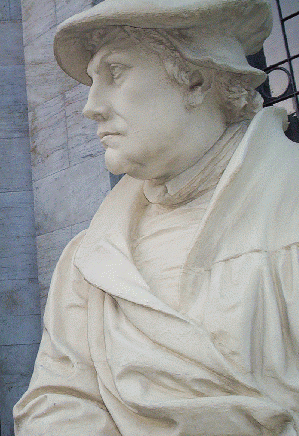Philosophers, it might surprise some people to learn, are, like great baseball pitchers, not always at the top of their game. Thus Kant defined Enlightenment as freeing people from dependency on tutelary figures, as challenging people to think for themselves. Fair enough, but he left out some important details that would have clarified his contention.
Pre-Enlightenment (aka Traditional) society rested on four major assumptions: Revelation, Scripture, Tradition, and Authority. That is, there is a God with a personality and an agenda (Revelation), the existence of which we discover through a Scripture (Torah, Gospel, Kor'an), which cannot be read or understood without the light provided by Tradition (Oral Law, Magisterium, Hadith, Sunna), as that is made accessible to us by Authority figures (rabbi, priest, minister, mullah). Call it STAR for mnemonic purposes--which is also a good pun because we were to chart our course in life by the light of these four foundational assumptions rather as sailors used to navigate by the light of the North Star.
It was the achievement of the Scientific Revolution (unintended) and the resulting Enlightenment (intended) to liberate us from the tyranny of those four objects of faith. That is what Kant meant but did not specify. The project, by the way, is obviously not concluded, there still being societies bound by STAR in the Muslim world, in counties in the South, and even in certain neighborhoods in allegedly hip Brooklyn.
But Kant's sin of omission pales next to the intellectual sin committed by Nietzsche. The latter lambasted Luther for coming along just when Christianity was on its deathbed (because of the terminal-seeming corruption in the Catholic Church) and reviving it by providing it fresh blood. One hates to differ with the great Nietzsche, but honesty compels one to. What Mayor LaGuardia of New York is supposed to have said, "I rarely make a mistake, but when I do it is a beaut!" applies to the Nietzsche.
Rebellions and heresies had been rife in medieval Catholic Europe but in one way or another they were stamped out. Luther succeeded. And in so doing, he knocked out two of the traditional four holy assumptions--Tradition and Authority. (It was left to Galileo, a century later, to marginalize the other two and so usher in modernity.)
Actually, Luther only half succeeded. When the dust cleared, the Church was still in solid control of the lower half of the continent. And that created a massive problem. Had he succeeded in destroying the church, we might still be living in the Middle Ages (leaving Galileo out of account for the moment). Had the church succeeded in destroying or neutralizing him (as was the case with Hus and Wycliffe), we again would still be living in the Middle Ages. But because he only half succeeded, he destroyed Christianity.
How is that possible? Well, here is the Bible. Catholics read it one way, Protestants read it another way. Who is right? And more important, how do you even begin to answer that question? There is no tribunal of objective persons one can turn to for a ruling on that matter. As for God, he has long ago, for whatever reasons, taken himself out of the business of intervening visibly in human affairs, so there is no point in asking Him to clarify matters.
But, wait, the problem is even worse. Each side is completely certain of its cause and readily consigns the other to hell (and acted accordingly with the sword and the torture rack). Elementary logic stipulates that both cannot be right. That, in turn, establishes the principle that one can be totally self assured and still be wrong, which raises the possibility that both sides, for all their arrogance, are wrong. Any conscientious thoughtful person is therefore left at sea. Indeed Shakespeare's contemporary, John Donne, expressed the dilemma in a mandate: "Seek true religion!" Lotsa luck, pal!
In the absence of triumph by the Catholic side or the Protestant side, a stalemate resulted. And that begot a revival of ancient skepticism, a respectable school of Greek philosophy, which had understandably lapsed into a coma during the millennium and a half of the triumphant Church. The discovery of the New World, with its natives living in apparent harmony (see Montaigne), like the concurrent rediscovery of the ancient world, with its many paragons of wisdom or virtue, in either case without the benefits of Christianity, helped revive subversive thoughts about the ruling ideology. But nothing did it as forcefully as the stalemate between the two claimants to the Truth.
So this is where Nietzsche went wrong. He did not see that, far from being a reviver of Christianity, Luther was the Moses who led us into the wilderness of subjectivity, perspectivism, relativism, skepticism, and all the other plagues of modernity that, among other things, ironically made Nietzsche's own heterodox thinking possible.
Given the many expressions of alleged piety all about us in the current American scene, the word "destroyed" used about Christianity seems excessive. But as an overarching system of thought and governance, as a hegemony, Christianity is dead as a dodo bird. If it still flourishes in certain precincts, it does so as a private matter, a hobby, an avocation, a matter of taste rather like a preference for chocolate. Pace the late Justice Antonin Scalia's fulminations about America as Christian, neither Jesus nor God appears in the Constitution. And it was the preceding Pope who spoke of "Post-Christian Europe."
So it was that, intending to purify and revive Christianity, Luther in the long run destroyed it. It is not the first or last case of the poverty of good intentions, of counter-productive actions, of the ironies and paradoxes that constitute human existence, of the errors that litter history books and are even to be found in the utterances of that iconic modern guru, Nietzsche.





